Octet may refer to:
Octet may refer to:
In music, a quartet is an ensemble of four singers.

Franz Peter Schubert was an Austrian composer of the late Classical and early Romantic eras. Despite his short life, Schubert left behind a vast oeuvre, including more than 600 secular vocal works, seven complete symphonies, sacred music, operas, incidental music, and a large body of piano and chamber music. His major works include the art songs Erlkönig, Gretchen am Spinnrade, Ave Maria; the Trout Quintet, the unfinished Symphony No. 8 in B minor, the "Great" Symphony No. 9 in C major, the String Quartet No. 14 "Death and the Maiden", a String Quintet, the two sets of Impromptus for solo piano, the three last piano sonatas, the Fantasia in F minor for piano four hands, the opera Fierrabras, the incidental music to the play Rosamunde, and the song cycles Die schöne Müllerin, Winterreise and Schwanengesang.

The term string quartet can refer to either a type of musical composition or a group of four people who play them. Many composers from the mid-18th century onwards wrote string quartets. The associated musical ensemble consists of two violinists, a violist, and a cellist.
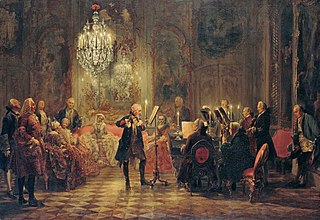
Chamber music is a form of classical music that is composed for a small group of instruments—traditionally a group that could fit in a palace chamber or a large room. Most broadly, it includes any art music that is performed by a small number of performers, with one performer to a part. However, by convention, it usually does not include solo instrument performances.

A string quintet is a musical composition for five string players. As an extension to the string quartet, a string quintet includes a fifth string instrument, usually a second viola or a second cello, or occasionally a double bass.
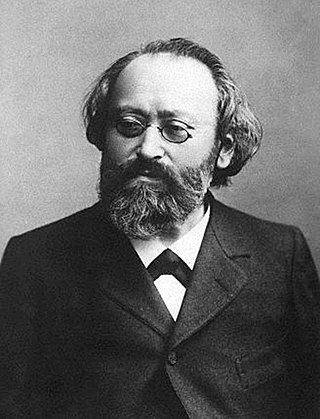
Max Bruch was a German Romantic composer, violinist, teacher, and conductor who wrote more than 200 works, including three violin concertos, the first of which has become a prominent staple of the standard violin repertoire.
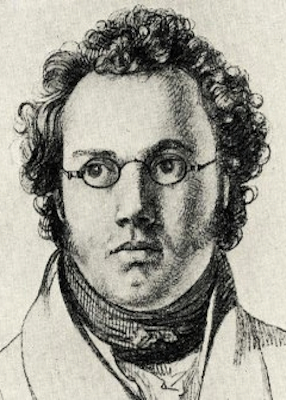
The Trout Quintet (Forellenquintett) is the popular name for the Piano Quintet in A major, D. 667, by Franz Schubert. The piano quintet was composed in 1819, when he was 22 years old; it was not published, however, until 1829, a year after his death.

Franz Paul Lachner was a German composer and conductor.
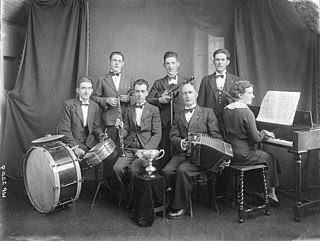
A septet is a formation containing exactly seven members. It is commonly associated with musical groups but can be applied to any situation where seven similar or related objects are considered a single unit, such as a seven-line stanza of poetry.
Cyclic form is a technique of musical construction, involving multiple sections or movements, in which a theme, melody, or thematic material occurs in more than one movement as a unifying device. Sometimes a theme may occur at the beginning and end ; other times a theme occurs in a different guise in every part.

Ferdinand (von) Hiller was a German composer, conductor, pianist, writer and music director.

The String Quartet No. 13 in A minor, D 804, Op. 29, was written by Franz Schubert between February and March 1824. It dates roughly to the same time as his monumental Death and the Maiden Quartet, emerging around three years after his previous attempt to write for the string quartet genre, the Quartettsatz, D 703, that he never finished.

The Octet in F major, D. 803 was composed by Franz Schubert in March 1824. It was commissioned by the renowned clarinetist Ferdinand Troyer and came from the same period as two of Schubert's other major chamber works, the 'Rosamunde' and 'Death and the Maiden' string quartets.

In music, an octet is a musical ensemble consisting of eight instruments or voices, or a musical composition written for such an ensemble.
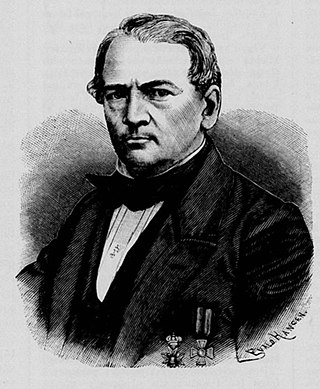
Ignaz Lachner was a German composer and conductor.

Kenneth Slowik is an American cellist, viol player, and conductor. Curator of Musical Instrument Collection at the National Museum of American History and Artistic Director of the Smithsonian Chamber Music Society. He took an interest in music and organology from an early age. He studied at the University of Chicago, the Chicago Musical College, the Peabody Conservatory, the Salzburg Mozarteum and, as a Fulbright Scholar, the Vienna Hochschule für Musik, guided by Howard Mayer Brown, Nikolaus Harnoncourt, Antonio Janigro, Edward Lowinsky, and Frederik Prausnitz.
The Melos Ensemble is a group of musicians who started in 1950 in London to play chamber music in mixed instrumentation of string instruments, wind instruments and others. Benjamin Britten composed the chamber music for his War Requiem for the Melos Ensemble and conducted the group in the first performance in Coventry.

A string octet is a piece of music written for eight string instruments, or sometimes the group of eight players. It usually consists of four violins, two violas and two cellos, or four violins, two violas, a cello and a double bass.
Franz Lachner’s Nonet in F major is a composition for chamber ensemble published in 1875.
Franz Lachner's Octet in B-flat major, Op. 156 is a composition for eight wind instruments composed around 1850. While scored for a chamber ensemble, the work is considered to be symphonic in scope.